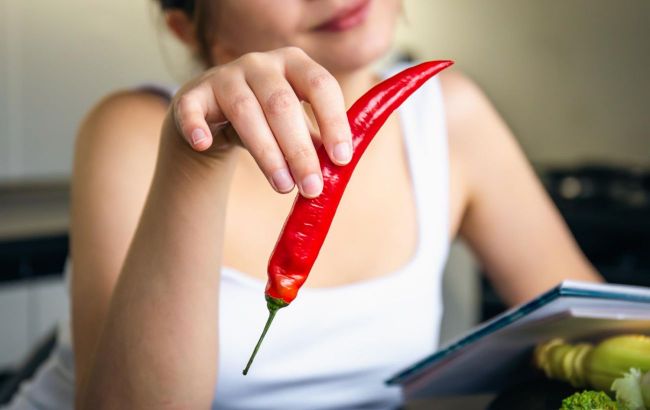Spicy food: benefit or harm? What happens to your body
 Is spicy food good for your health? (Photo: Freepik)
Is spicy food good for your health? (Photo: Freepik)
Spicy sauces and chili peppers have long been an integral part of many culinary recipes. Some people cannot imagine life without the spicy taste, while others avoid spicy foods. How does such food affect health?
What makes spicy food so hot
Dietitian Amanda Sauсeda explained that the component in chili peppers that brings the heat is called capsaicin. When you eat chili, capsaicin binds to and activates specific pain receptors in the mouth and throughout the digestive tract.
The pain it causes is transmitted to the brain as a sensation of burning or an increase in temperature, prompting the brain to tell the body to cool down.
Sweating may occur, or blood vessels may dilate and direct heat to exit the body through the skin, causing redness. Tears, a runny nose, or excess saliva are also typical reactions to capsaicin because the body may perceive it as an irritant that needs to be washed away.
Benefits of eating spicy food
Antioxidant properties
Free radicals are compounds formed as a result of natural processes in the body, as well as environmental factors such as alcohol, polluted air, and smoking.
An excess of free radicals in the body can lead to cell and DNA damage and, over time, can cause chronic diseases. Antioxidants neutralize free radicals in the body, and capsaicin in spicy food can act as an antioxidant.
Hot peppers are also a source of vitamin C, a powerful antioxidant. One green chili pepper provides 121% of the recommended daily intake of vitamin C, while one red chili pepper contains 72% of the recommended daily intake.
Impact on the intestine
Studies show that capsaicin can affect the gut microbiome. Capsaicin can increase the number of beneficial bacteria and reduce harmful ones in the lower part of the gastrointestinal tract.
Disadvantages of spicy food
Сauses heartburn and acid reflux
Spicy food is one of the foods to avoid if you are prone to heartburn or acid reflux. Spicy food irritates the esophagus as it moves down to the stomach and also causes the lower esophageal sphincter to relax.
This sphincter prevents the stomach contents from washing back up into the esophagus. When it relaxes, it means food and stomach acid return, promoting acid reflux and heartburn. Even if you do not have acid reflux, heartburn is a way of saying that you have overdone it with spicy food.
Gastrointestinal problems
Capsaicin irritates the tissues of the gastrointestinal tract, so the body may perceive it as a threat. In response, the muscle walls of the intestines intensify contractions to move food with capsaicin through the gastrointestinal tract to get rid of it.
This is why many people have to rush to the bathroom when they eat spicy food. It is a sign that you've eaten more chili than your body can handle.
You might be interested in 11 sweet snacks that won't harm your health.
This material is for informational purposes only and should not be used for medical diagnosis or self-treatment. Our goal is to provide readers with accurate information about symptoms, causes, and methods of detecting diseases. RBС-Ukraine is not responsible for any diagnoses that readers may make based on materials from the resource. We do not recommend self-treatment and advise consulting a doctor in case of any health concerns.

